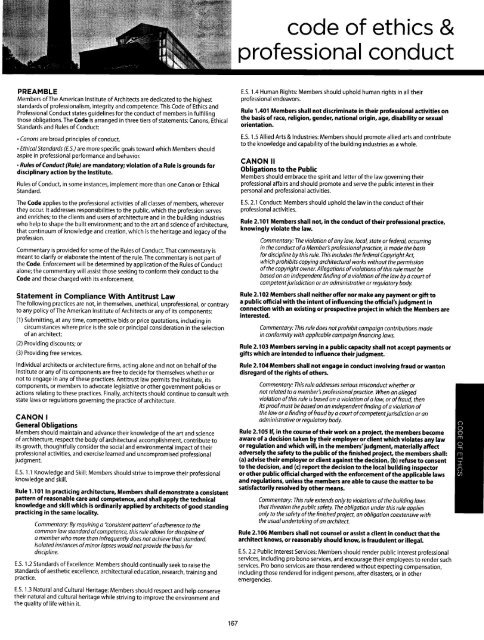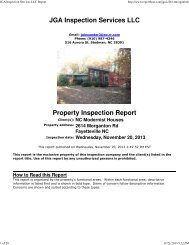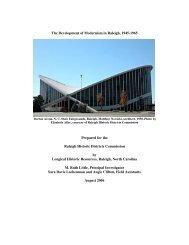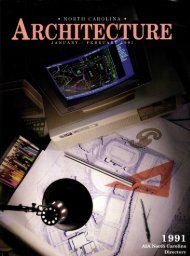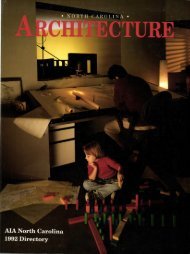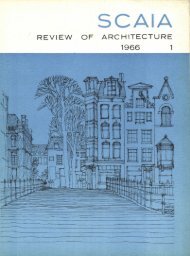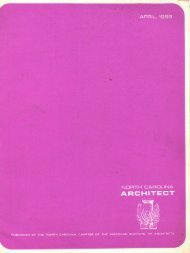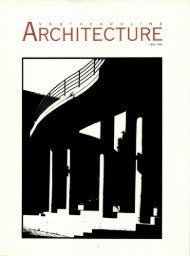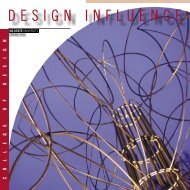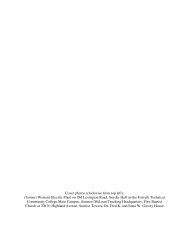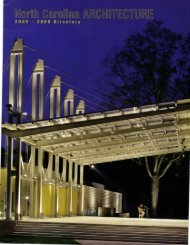Directory - Triangle Modernist Houses
Directory - Triangle Modernist Houses
Directory - Triangle Modernist Houses
- No tags were found...
You also want an ePaper? Increase the reach of your titles
YUMPU automatically turns print PDFs into web optimized ePapers that Google loves.
code of ethics &professional conductPREAMBLEMembers of The American Institute of Architects are dedicated to the higheststandards of professionalism, integrity and competence. This Code of Ethics andProfessional Conduct states guidelines for the conduct of members in fulfillingthose obligations. The Code is arranged in three tiers of statements: Canons, EthicalStandards and Rules ofConduct:. Conons are broad principles of conduct.. Ethical Stondards (E.5.)are more specific Aoals toward which Members shouldaspire in professional performance and behavior.. Rules of Conduct (Rule) are mandatory; violation of a Rule is grounds fordisciplinary action by the Institute.Rules of Conduct, in some instances, implement more than one Canon or EthicalStandard.The Code applies to the professional activities of all classes of members, whereverthey occur. lt addresses responsibilities to the public, which the profession servesand enriches; to the clients and users of architecture and in the building industrieswho help to shape the built environment; and to the art and science of architecture,that continuum of knowledge and creation, which is the heritage and legacy of theorofession.Commentary is provided for some of the Rules of Conduct. That commentary ismeant to clarify or elaborate the intent of the rule. The commentary is not part ofthe code. Enforcement will be determined by application of the Rules of conductalone; the commentary will assist those seeking to conform their conduct to theCode and those charged with its enforcement.Statement in Compliance With Antitrust LawThe following practices are not, in themselves, unethical, unprofessional, or contraryto any policy of The American Institute of Architects or any of its components:(1) Submitting, at any time, competitive bids or price quotations, including incircumstances where price is the sole or principal consideration in the selectionof an architecu(2) Providing discounts; or(3) Providing free services.Individual architects or architecture firms, acting alone and not on behalf of theInstitute or any of its components are free to decide for themselves whether ornot to engage in any of these practices. Antitrust law permits the lnstitute, itscomponents, or members to advocate legislative or other government policies oractions relating to these practices. Finally, architects should continue to consult withstate laws or regulations governing the practice of architecture.CANON IGeneral ObligationsMembers should maintain and advance their knowledge of the art and scienceof architecture, respect the body of architectural accomplishment, contribute toits growth, thoughtfully consider the social and environmental impact of theirprofessional activities, and exercise learned and uncompromised professionaljudgment.E.5. 1.1 Knowledge and skill: Members should strive to improve their professionalknowledge and skill.Rule 1.101 In practicing architecture, Members shall demonstrate a consistentpattern of reasonable care and competence, and shall apply the technicalknowledge and skill which is ordinarily applied by architecis of good standingpracticing in the same locality.Commentory: By requiring a'tonsistent pattern" of adherence to thecommon law standard of competence, this rule allows for discipline ofa member who more thon infrequently does not achieve thot stondord.lsolated instances of minor lapses would not provide the basis fordiscipline.E.s. 1.2 Standards of Excellence: Members should continually seek to raise thestandards of aesthetic excellence, architectural education, research, training andoractice.E.S. 1.4 Human Rights: Members should uphold human rights in all theirprofessional endeavors.Rule 1.401 Members shall not discriminate in their professional activities onthe basis of race, religion, gender, national origin, age, disability or sexualorientation.E.S. 1.5 Allied Arts & Industries: Members should promote allied arts and contributeto the knowledge and capability of the building industries as a whole.CANON IIObligations to the PublicMembers should embrace the spirit and letter of the law governing theirprofessional affairs and should promote and serve the public interest in theirpersonal and professional activities.E.S. 2.1 Conduct: Members should uphold the law in the conduct of theirprofessional activities.Rule 2.101 Members shall not, in the conduct of their professional practice,knowingly violate the law.Commentary: The violation of any law, local, state or federal, occurringin the conduct of a Member's professional practice, is made the basisfor discipline by this rule. This includes the federol Copyright Act,which prohibits copying architecturalworks without the permissionof the copyright owner. Allegations of violations of this rule must bebased on an independent finding of a violation of the law by a court ofcompetent jurisdiction or an administrotive or regulatory body.Rule 2.102 Members shall neither offer nor make any payment or gift toa public official with the intent of influencing the official's judgment inconnection with an existing or prospective project in which the Members areinterested.Commentory:This rule does not prohibit compoign contributions madein conformity with opplicable campaign finoncing laws.Rule 2.103 Members serving in a public capacity shall not accept payments orgifts which are intended to influence their judgment.Rule 2.104 Members shall not engage in conduct involving fraud or wantondisregard of the rights of others.Commentary: This rule addresses serious misconduct whether ornot related to a member's professionol practice. When an ollegedviolotion of this rule is based on a violation of o law or of froud, thenits proof must be based on on independent finding of a violotion ofthe law or a finding of froud by a court of competent jurisdiction or ona d m i n i strat ive or reg u I atory body.Rule 2.105 lf, in the course of their work on a project, the members becomeaware of a decision taken by their employer or client which violates any lawor regulation and which will, in the members'judgment, materially affectadversely the safety to the public of the finished project, the members shall:(a) advise their employer or client against the decision, (b) refuse to consentto the decision, and (c) report the decision to the local building inspectoror other public official charged with the enforcement of the applicable lawsand regulations, unless the members are able to cause the matter to besatisfactorily resolved by other means.Commentary: This rule extends only to violations of the building lawsthot threoten the public safety. The obligotion under this rule appliesonly to the sofety of the finished project, an obligation coextensive withthe usual undertaking of an architect.Rule 2.106 Members shall not counsel or assist a client in conduct that thearchitect knows, or reasonably should know, is fraudulent or illegal.E.5.2.2 Public Interest Services: Members should render public interest professionalservices, including pro bono services, and encourage their employees to render suchservices. Pro bono services are those rendered without expecting compensation,including those rendered for indigent persons, after disasters, oiin otheremergencies.E.s. 1.3 Natural and cultural Heritage: Members should respect and help conservetheir natural and cultural heritage while striving to improve the environment andthe quality of life within it.167


